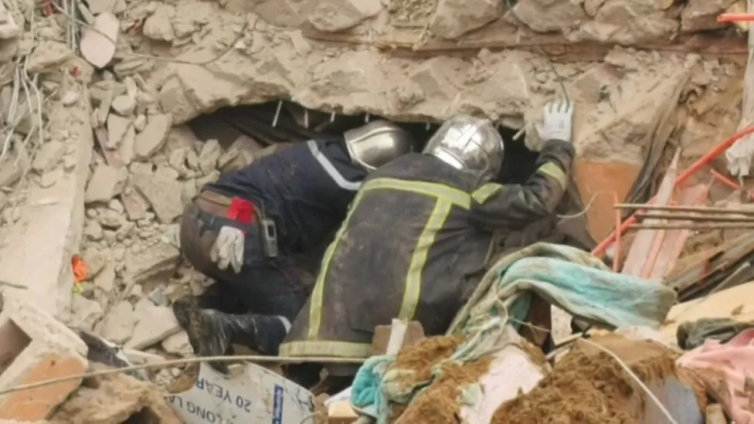Thirty-three people are now known to have died in Cameroon's biggest city, Douala, after a four-storey building collapsed and fell onto another residential block.
It happened early on Sunday morning in the city's Ange Raphaël neighbourhood and the cause is still not clear.
At least 21 people have been injured, many of whom are receiving treatment at the nearby Laquintinie Hospital.
A three-year-old girl who was taken to hospital on Sunday later died.
Distressed neighbours have been searching the rubble for survivors along with emergency services.
The regional governor, Samuel Dieudonné Ivaha Diboua, has sought to reassure people - saying the situation is under control and rescue teams will make sure nobody is left beneath the wreckage.
A top official tells the BBC he is bitterly disappointed that lives have been lost despite strides made in recent years to improve safety.

"We'd been happy not to have had any such disasters for a while now - especially in Douala where the mayor is really trying to bring order," says Kizito Ngoa, the head of Cameroon's Order of Civil Engineers which regulates housing in the country.
Since Douala's last big building collapse in 2016, the city council has been knocking down homes deemed at risk from flooding or landslides, but the four-storey block that collapsed on Sunday was not earmarked for demolition.
Residents told journalists that it looked dilapidated but local officials have not confirmed what caused the accident.
In a statement on Sunday they reminded anyone wanting to build homes in Douala that they must first get an official permit and then "stick rigorously to the approved design".
Mr Ngoa tells the BBC that the failure to follow planning rules is one of the biggest causes of building collapses across the country, and says the true cost of a construction project should be made clear to the public.
"There is a widespread feeling that everyone can just do what they want" and "there is obviously this desire to save money at all stages of a project".
Sometimes council workers are complicit in this, he says, and when sanctions and inquiries do happen they are not publicised enough.
Latest Stories
-
French MPs back law to allow assisted dying
34 minutes -
Second suspect arrested in alleged crypto torture scheme
45 minutes -
United is narrowing its check-in window for US flights. Here’s how it compares to other airlines
58 minutes -
Foreign Minister should pursue quiet diplomacy, not opulism – Minority Caucus urges tact and engagement
1 hour -
Chairman Wontumi hospitalised after arrest – Lawyer says interrogation suspended
2 hours -
‘Ghana is slipping into the dark days’, says NPP after Wontumi’s arrest
2 hours -
‘We still don’t know why he was taken’ – NPP protests Wontumi’s Rambo-style arrest
3 hours -
We’re not leaving until EOCO releases Wontumi – NPP supporters vow
3 hours -
Wontumi was arrested in a rambo style as if he’s a terrorist – Nana B
3 hours -
‘We will resist political harassment’ – NPP fires warning after Wontumi arrest
3 hours -
Trump administration seeks to pull estimated $100m in Harvard funding
3 hours -
Trump administration halts scheduling of new student visa appointments
4 hours -
Nana Fredua-Agyeman Jnr. eulogises Nana Kwasi Gyan-Apenteng
4 hours -
NPP supporters attack JoyNews reporter during Wontumi’s EOCO detention coverage
4 hours -
Security tightened at EOCO as tension mounts over Wontumi’s arrest
4 hours

